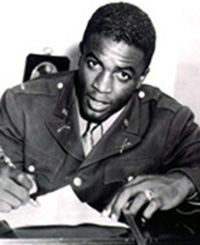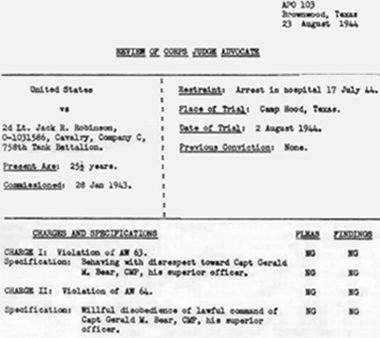
Jackie Robinson in Uniform
Source: Baseball Hall of Fame
Black members of the military faced problems getting to town and between towns. Buses and other transportation to and from local towns and between one post and another were often segregated, whether in practice or through the efforts of local commanders. A number of incidents involved blacks refusing to tolerate the segregation of military buses or civilian buses going to and from military posts and bases. A black soldier traveling with other soldiers, some white, on a bus from Daniel Field to August, Georgia, refused to get off the bus when ordered to do so by the driver. Blacks from Turner Field, Georgia, protested segregated bus seating. A black Army nurse from Tuskegee Field, Alabama, was beaten when she refused to get off a bus. At Camp Gordon Johnston, Florida, three black officers refused to change seats on a bus, citing military directives about equal access to buses. A Tuskegee Airman, Roscoe Brown, would recall that, having recently graduated from flight school, he got on a bus going from Montgomery, Alabama, to Tuskegee Field. When the driver stopped the bus to tell Brown that he had to move to the back of the bus, Brown replied that he was going to fight in the War, and he would choose the seat he wanted. When Brown refused to change seats, the bus driver eventually gave up.1
Jackie Robinson, who would later desegregate major league baseball, attempted to desegregate a much smaller venue years before: a bus of the United States Army. Robinson was drafted into the Army in 1942 and posted to Fort Hood in March 1944. At Fort Hood, Robinson refused to change seats on a military bus, which should not have been segregated according to official Army policy. Jackie Robinson was taken off the bus by military police, and while reports vary about what happened next, Robinson was court-martialed. Acquitted, he missed his chance to serve in Europe and would spend the rest of his tour at Camp Breckenridge, Kentucky, and be discharged in 1944.2

Excerpt from Review of Robinson Court Martial
Source: National Archives
